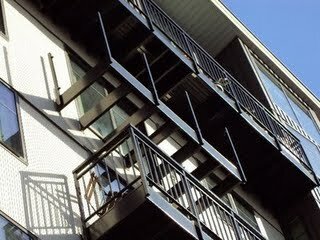(h/t to Belltownpeople)
The slogan for Belltown's Moda condominiums is "Fashionable living. With money left for life." There is not, apparently, money left to pay the subcontractors who installed the balconies.
Last Friday, Hideous Belltown was tipped off by a passer-by that men on a ladder were partially removing balconies from Moda. He inquired what they were up to, and they said they were owed $20,000 and were taking the balconies back.
Hideous Belltown's Keller took a walk by this week and it was true--the railings were gone from a number of balconies. The word is, the units of each are occupied, so there's a chance here for a particularly brave resident to--if he or she survives--to file a spectacular personal injury lawsuit.
 Photo courtesy of Hideous Belltown/Igor Keller
Photo courtesy of Hideous Belltown/Igor Keller
Moda, unsurprisingly, did not return Hideous Belltown's call for comment.
Robert Bogue, Melinda Wallace in SSR's "The Emperor's New Clothes" Photo by Tiger Mountain Photo
Just received the latest round of depressing news from an arts organization: Redmond's SecondStory Rep may become the first mid-size theatre company in the area to be completely done in by the recession.
From the press release:
SecondStory Repertory, Redmond 's only professional theater company, faces the most severe financial crisis of its decade-long life. This beloved theatrical producer and presenter has entertained tens of thousands from its convenient second story home inside Redmond Town Center . Now, in its 11th season, the theater is faced with the daunting challenge of raising $80,000 by December 31, 2009 or entering bankruptcy and ceasing all operations immediately.
The company's budget shortfall has been increasing since 2006, despite valiant fundraising efforts. Compounding the decline in arts funding, ticket sales have been depressed by as much as 40 percent for SSR's children's theatre presentations. If you have the ability to help out the company financially, please visit their website here.
For nearly two decades, Seattle’s economy, led by the real estate market, was on a bender. With momentary bouts of sobriety in the early 1990s and post 9/11, Seattle partied day and night. Prices rose, jobs were plentiful, cash and credit were easy.
But all great parties have to end and you wake to face the morning after, when you often struggle to remember just what you did and why. And almost instantly you can feel the regret streaming in.
Seattle’s morning after is still in its early stages; we’ve barely woken up and things are still a blur. Did we really lose the Sonics? To Oklahoma City? Did we really build a streetcar in South Lake Union? Thank God, I’ve got my money in WaMu! Did I really spend $600,000 on an 800-square-foot condo with $800 HOA dues?
The terrible realities of that last question are coming into focus. This morning, Seattle Times reporter Drew DeSilver wrote about Sterling Bank's current trouble: too many bad commercial real estate loans. The Feds have ordered Sterling to raise $300 million dollars by December 15. Sterling responded by firing their CEO and pledging to raise capital.
Sterling isn’t going it alone as a bank in trouble because of the commercial real estate market. It’s been a bad year for local community banks all over the state. During the height of the real estate party, it made sense for these banks to loan money to commercial developers, particularly residential developers. Seattle leaders threw around words like “urban density” and handed out permits like an East Texas patrolman hands out speeding tickets.
With willing lenders and compliant public leadership, condo projects, apartment buildings, townhouses and mixed-use retail and residential buildings sprouted up all over town. Prices rose and it looked like the party would never end. More and more loans went out to commercial developers, who also started more plans for retail malls and office buildings to house hungry and shopping-happy workers.
But the party ended and nowhere has the lingering hangover been worse than in the condo market. Condos have never been considered the safest real estate investment. Historically, condos are hard to resell, so the inflated prices fell harder in that market than in single family homes. Completed projects, like Brix on Capitol Hill, have turned to auctioning off properties at bargain prices.
Other projects have converted to rental units, but struggle to find renters. Prices across the board have fallen hard. Those buyers who purchased on the way up, are now facing vastly decreased values and will no doubt have to hold on to their condos for many years in the hope that values will, one day, return....
"Way South" courtesy of The SunBreak Flickr Pool member Great_Beyond
The National Association for Business Economics created a stir yesterday when they announced the Great Recession was over--well, 80 percent of them did. This is not that surprising, as they never really believed in it to begin with.
Back in November 2007, only 20 percent of the same group put the risk of a recession at more than 50 percent. (It's now agreed that the recession began in December 2007.)
However, they are consistent: in May of this year they predicted an end to the recession by the third quarter, and here we are. Must be over.
It's true that some indicators nosed up slightly recently (thanks to Jon Talton for pointing out the link), but it feels as if you are ignoring the overall economic context (the temporary effects of spending over a trillion dollars in stimulus, for one) if you take that as evidence for the recession's end. Even if you obsess strictly about business indicators, while there's been a small uptick in manufacturing and retail, just locally, Talton observes, we also have: "The loss of Washington Mutual, the embarrassing failure of the Starwood project and potentially record vacancy rates downtown...." To say nothing of our record-high (but in fact significantly understated) unemployment rate....


Most Recent Comments